-
Does Coconut Oil Pulling Actually Work?
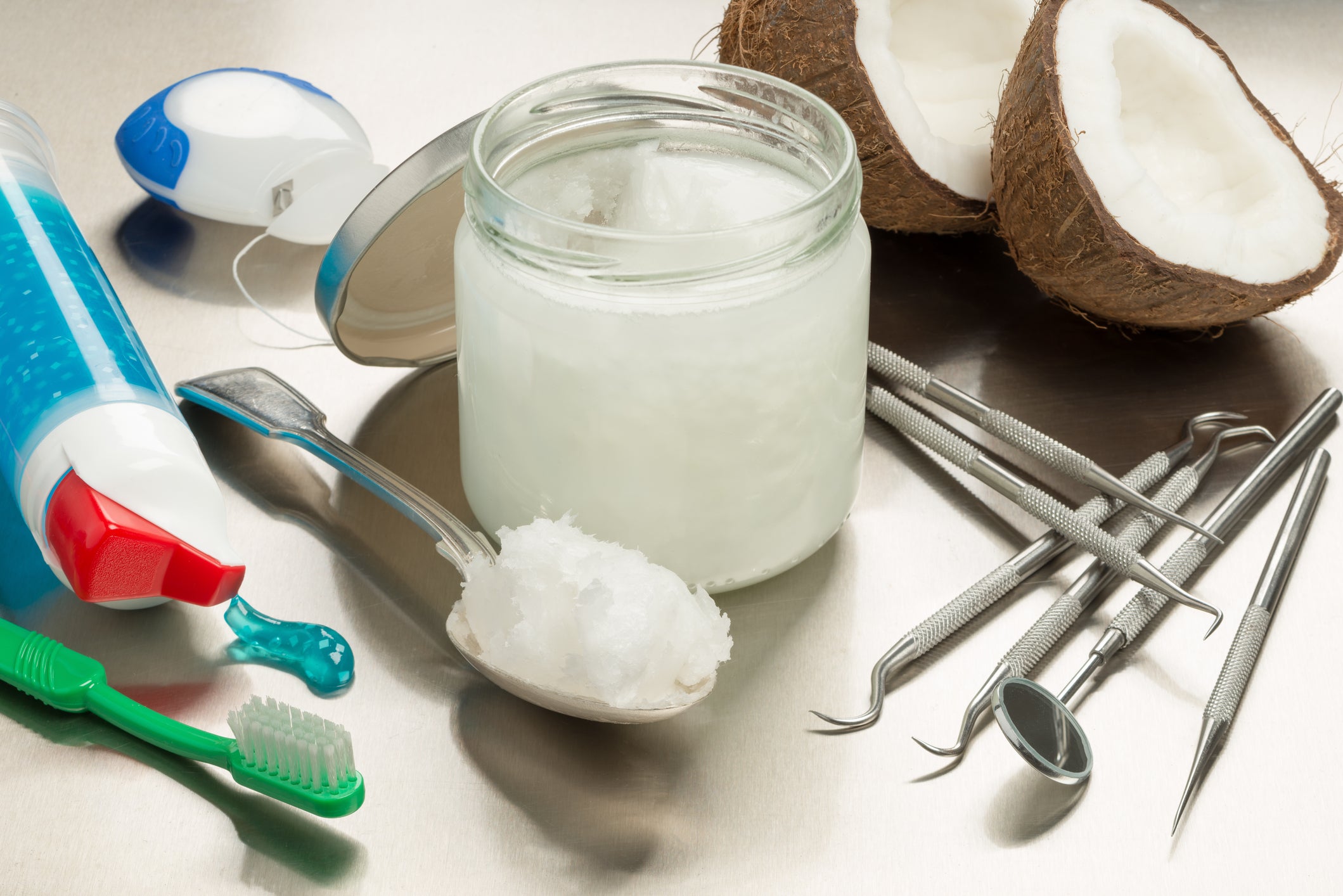
Have you heard of oil pulling? Essentially, it’s the practice of swirling oil around your mouth and then spitting it out. Why do people do this, and is it actually a good idea?
The practice of oil pulling originated as a folk remedy, part of traditional Ayurvedic medicine in ancient India. People practicing oil pulling use sunflower oil, sesame seed oil, or, most frequently, coconut oil. This oil is swirled around the mouth for somewhere between five and twenty minutes, long enough to be swished all over the teeth and mouth, and then it is spit out into the sink or trash can.
Proponents of oil pulling claim that it removes toxins and bacteria from the body, pulling them out through the gums and mouth. Many different benefits are attributed to oil pulling, and advocates claim it can whiten teeth, treat tooth decay, eliminate bad breath, heal bleeding gums, prevent cavities, heal the sinuses, and even prevent heart disease. Some go even further, saying it can help with allergies and asthma, chronic fatigue, diabetes, migraine headaches, and acne.
If these claims seem a little over the top to you, you have good instincts. From a scientific standpoint, there’s very little evidence to back up these claims. The ADA (American Dental Association) doesn’t recommend it because of a lack of science; there just haven’t been an adequate number of properly conducted studies to confirm its efficacy.
On the other hand, there is research to show that oil pulling can have one particular benefit for your oral health. Some studies have indicated that oil pulling with coconut oil can significantly reduce the number of Streptococcus mutans bacteria in your mouth. This is good news, because S. mutans is one of the primary factors in plaque buildup and tooth decay. So, while oil pulling is unlikely to be the cure-all some claim it to be, by removing some bacteria from your mouth it can reduce your risk of tooth decay, gum disease, and bad breath.
Does this mean you should try it? It’s up to you. There’s very little risk involved in oil pulling, as long as you use a reputable oil and then spit it out and don’t inhale it. Here’s the most important thing to remember, though: oil pulling is no substitute for good dental hygiene. Try it if you’re interested, but don’t stop brushing your teeth at least twice a day and flossing at least once.
When you’re looking for excellent dental care and advice you can trust, choose the practice that was voted best dentist in NYC! At Park 56 Dental Group, we offer pediatric, prosthodontics, endodontics, oral surgery, Invisalign®, emergency, and sedation dentistry, all at the highest level of treatment. We serve the Midtown, Central Park, Upper East Side, Park Avenue, and all surrounding Manhattan and New York areas, with a patient-centered practice that has hours to fit your schedule. Schedule your complimentary consultation today by contacting us online or calling us at (212) 826-2322.
-
What to Look for When Buying Toothpaste
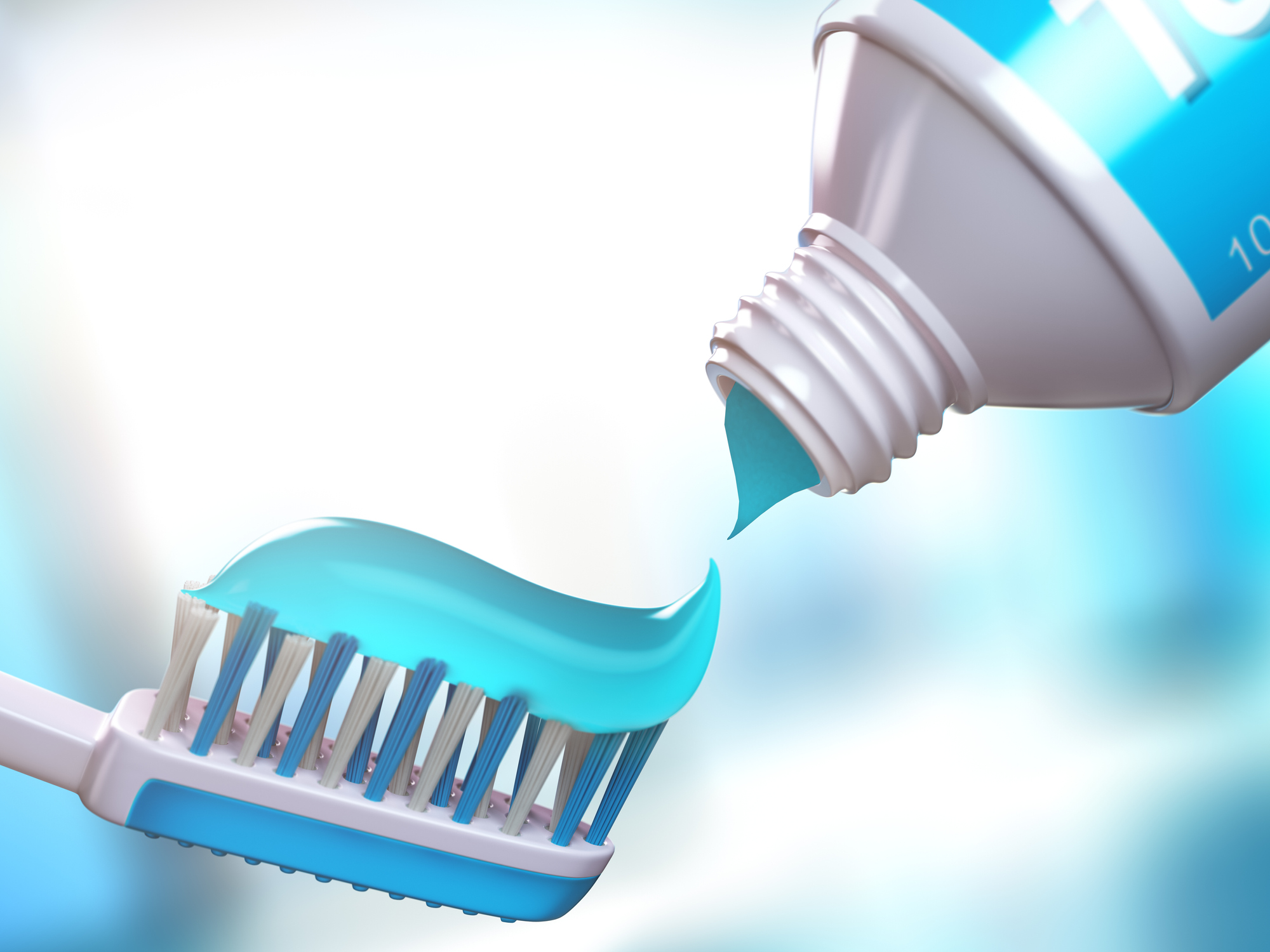
Buying toothpaste seems like it would be a simple process. When confronted by shelves and shelves of options, though, it can quickly become complicated. Add in some social media ads about alternative toothpastes and it’s understandable that you might be completely confused. Not to worry! We’ve got some tips to make buying your next tube of toothpaste simple.
- Make sure the toothpaste you pick is ADA approved. Toothpastes with the ADA seal of approval are safe to use and guaranteed to be effective.
- Check for fluoride. Fluoride helps prevent tooth decay by strengthening your tooth enamel. When you use toothpaste with fluoride, you can maintain and, in some cases, improve your oral health. There are two types of fluoride found in toothpastes, stannous fluoride and sodium fluoride, with stannous being the more effective type.
- Take a close look at the ingredients. Sodium laurel sulphate (SLS), for example is a controversial ingredient. While it’s useful for cleaning the teeth, removing bacteria, plaque, and food particles, there is also evidence that it can contribute to sensitivity and cause mouth ulcers for some people. If your teeth are sensitive, avoid SLS. If you do use it, don’t swallow it, because it can negatively impact your health. People with sensitive teeth might wish to look for potassium nitrate and strontium chloride, which can help desensitize teeth. Be wary of triclosan because this common bacteria-fighting ingredient may actually contribute to bacterial resistance.
- Consider your specific needs in dental care. Are you looking for better tartar control? Tooth whitening? Desensitizing? Gum health? Think about what you’re hoping to achieve with your oral care and that will help inform your toothpaste decision.
- Think about flavor and texture. While it may seem frivolous to choose a toothpaste based on the way it feels and tastes, it’s actually an important piece of the puzzle when you’re shopping for the right toothpaste for you. If you don’t like the way your toothpaste tastes, brushing your teeth will be less appealing.
- What about alternatives to traditional toothpaste? There are some toothpastes that use unconventional ingredients and are somewhat trendy, but are they as effective as traditional toothpaste? Probably not. For instance, toothpastes that use aloe vera aren’t likely to fight plaque or gingivitis any more effectively than other toothpastes, and most aloe vera toothpastes lack fluoride. Charcoal is another trendy toothpaste ingredient, but it may do more harm than good, because it is abrasive and can damage your tooth enamel.
- Ask your dentist for recommendations. When in doubt, ask a professional! Your dentist is an expert not only on tooth care but also on your unique oral health history.
If you’re looking for a dentist in New York, choose the practice that was voted best dentist in NYC! At Park 56 Dental Group, we offer pediatric, prosthodontics, endodontics, oral surgery, Invisalign®, emergency, and sedation dentistry, all at the highest level of treatment. We serve the Midtown, Central Park, Upper East Side, Park Avenue, and all surrounding Manhattan and New York areas, with a patient-centered practice that has hours to fit your schedule. Schedule your complimentary consultation today by contacting us online or calling us at (212) 826-2322.
-
How Dieting Can Cause Bad Breath

Over the past ten years, there has been a lot of debate about low-carb diets such as the Keto and Atkins diets. Most of this discussion is about how they work, and whether they help people keep weight off for a long period. An overlooked aspect of these diets is their tendency to cause bad breath, also known as halitosis. Some people have taken to calling this phenomenon “keto breath.” How does this happen?
One of your body’s main sources of energy is glucose. Glucose is formed when your digestive system breaks down carbohydrates from complex sugars into simple glucose molecules. When you eat fewer carbohydrates, your body has to find other fuel sources (primarily fat) for energy. This metabolic state is known as ketosis.
When your body breaks down fatty acids, it creates a byproduct known as ketone bodies, or ketones. They come in three common forms: acetoacetate, beta-hydroxybutyrate, and acetone. These are regularly removed from your body when you exhale or urinate.
If you consume a low-carb diet, your body relies more on fatty acids for energy because you aren’t consuming as many carbohydrates. As you use up more fatty acids, more ketones are released as a byproduct of the metabolic process at work.
This surplus of ketones in your body can contribute to bad breath. But the ketones you exhale have very particular odors, which are mostly not like what you experience with normal diet bad breath.
There’s another bad breath factor with low-carb diets. The sudden transition from carbs to proteins changes how the body metabolizes food. The breakdown of protein creates ammonia. A sudden increase in dietary protein will only exacerbate this effect, increasing the amount of ammonia in your urine as well as your stomach gasses. Since it takes a lot of water to remove ammonia from your system, insufficient hydration can degrade your breath as this excess ammonia builds up in your body.
If low-carb diets have helped you, don’t despair. Some people on low-carb diets don’t develop bad breath. With others, it’s a temporary effect of the rapid diet change. And there are ways to mitigate the effect:
- Drink lots of water
- Use mints and/or gum to mask odors
- Brush your teeth at least twice a day
- Floss daily
- Transition slowly into your new diet and see how these changes affect you
If you’re experiencing halitosis, or if you just need the perfect place to get your teeth cleaned or fixed, choose the practice that was voted best dentist in NYC! At Park 56 Dental Group, we offer pediatric, prosthodontics, endodontics, oral surgery, Invisalign®, emergency, and sedation dentistry, all at the highest level of treatment. We serve the Midtown, Central Park, Upper East Side, Park Avenue, and all surrounding Manhattan and New York areas, with a patient-centered practice that has hours to fit your schedule. Schedule your complimentary consultation today by contacting us online or calling us at (646) 679-3989.
-
How to Prevent Plaque
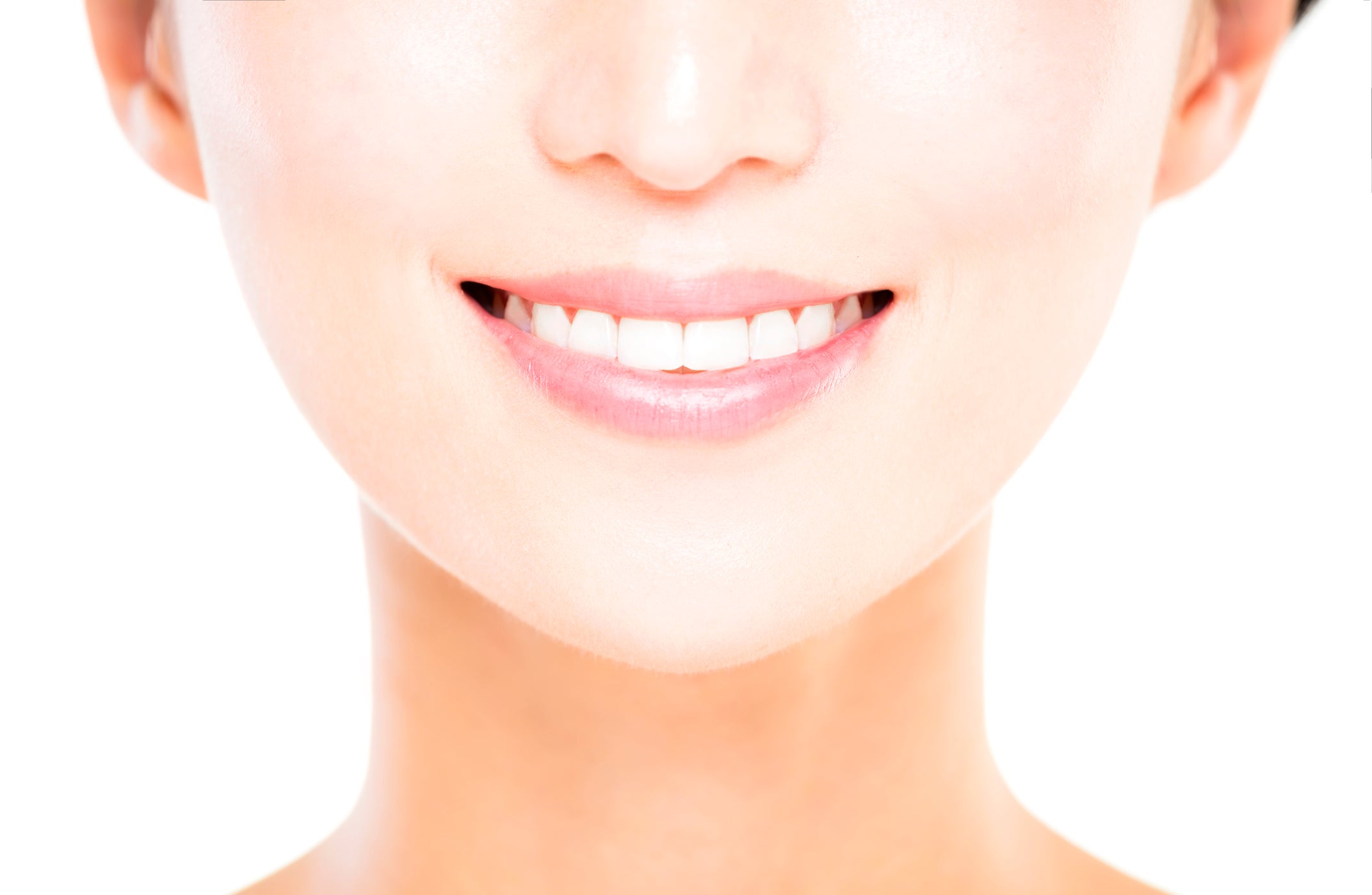
Everyone knows that if we don’t take care of our teeth we can get cavities. One cause of cavities is the buildup of plaque, which can also cause gum disease. Here’s an overview of what plaque is and how we can prevent it.
Everyone has dental plaque to some extent. Plaque causes a slight fuzziness on your teeth that you can feel with your tongue. It’s a sticky film of bacteria that is constantly developing on the surface of your teeth. The bacteria in plaque produce acids after you eat or drink. These acids can destroy your tooth enamel, leading to cavities and also gingivitis aka gum disease.
Plaque can also form under your gums and on your tooth roots. They can break down the jaw bones that support your teeth. If left untreated, plaque can harden into tartar, which is harder to remove. Proper dental hygiene habits, most importantly daily brushing and flossing, gets rid of a lot of this plaque. If you don’t like using normal dental floss there are options for you, including dental picks, pre-threaded flossers, brushes that fit between your teeth, water flossers or wooden plaque removers. Mouthwash is useful for loosening plaque so you can brush it off better, or spit or rinse it out of your mouth. But be careful to not get a kind that will dry your mouth out, because that actually makes your mouth more vulnerable to plaque formation.
Although we all get plaque, you may be more susceptible to plaque formation if you:
- Smoke
- Have dry mouth due to medical conditions or medications
- Have a history of head or neck radiation
Your diet is also an important factor for plaque formation. Plaque can form quickly when the bacteria in your mouth mixes with sugary or starchy foods such as soft drinks, milk, juice, fruit, pasta or bread. These bacteria release acids that break down carbohydrates in food and drinks, so they do serve a useful function in that regard. Plaque is clearly a downside. Many dentists will tell you that you can eat or drink pretty much whatever you like, as long as it’s in moderation. Whenever possible, drink water or brush your teeth right after consuming these problematic foods or drinks, to get that dangerous stuff off your teeth before they can help form plaque.
Regular dental cleanings are important too, because there are spaces that are hard for you to clean on your own. Dentists and dental hygienists have special tools to find and remove plaque.
If you’re looking for the perfect place to get your teeth cleaned or fixed, choose the practice that was voted best dentist in NYC! At Park 56 Dental Group, we offer pediatric, prosthodontics, endodontics, oral surgery, Invisalign®, emergency, and sedation dentistry, all at the highest level of treatment. We serve the Midtown, Central Park, Upper East Side, Park Avenue, and all surrounding Manhattan and New York areas, with a patient-centered practice that has hours to fit your schedule. Schedule your complimentary consultation today by contacting us online or calling us at (646) 679-3989.
-
What Are Our Teeth Made Of?
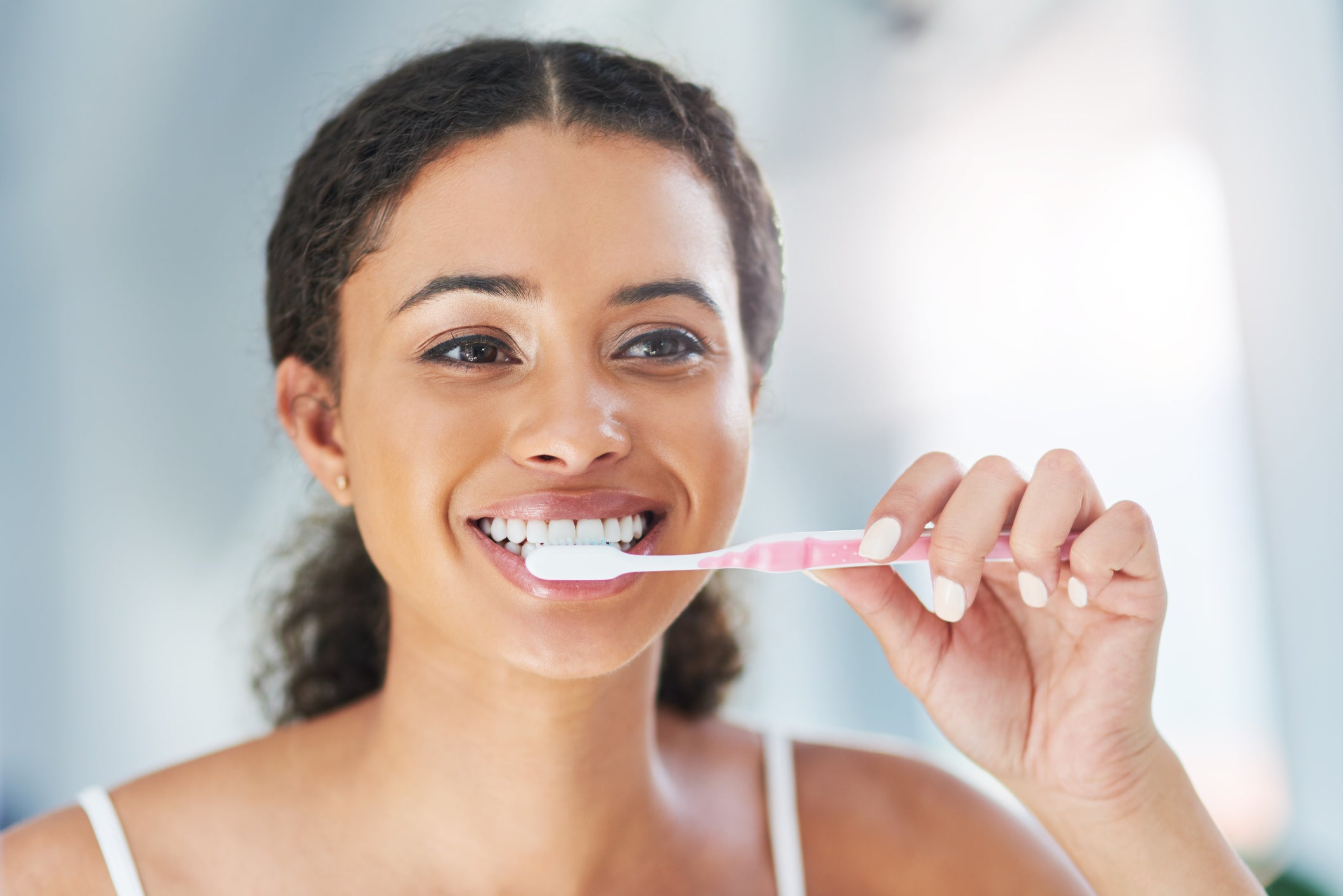
Most people know the basics of dental care, but how many of us really know the anatomy of our teeth? Here’s a short overview of what our teeth are made of.
Crown
Quite simply, the crown is the part of the tooth that you can see.
Enamel
The hardest tissue in your whole body is the enamel of your teeth, which forms the outermost layer of the crown. This substance is why your teeth can withstand the pressure from chewing hard foods. It also protects your teeth from harmful bacteria and acids, as well as hot and cold foods. Enamel mostly consists of calcium phosphate, a rock-hard mineral.
Dentin
Right below the enamel is a yellowish material called dentin. It is a hard tissue made of microscopic tubes. When the enamel is damaged or worn away, heat or cold can enter the tooth through these tubes and cause pain. Every tooth is mostly dentin, which is why teeth have a slight yellowish tint. Like enamel, dentin mostly consists of apatite crystals of calcium and phosphate. This makes it hard as bone, but it’s not quite as hard as enamel.
Pulp
Below dentin is pulp, the softest, most alive and innermost portion of the tooth. Pulp consists of connective tissue , nerves, and blood vessels, which nourish your teeth. Pulp has two parts — the pulp chamber, which is in the crown, and the root canal, which lies in the root of the tooth. Nerves and blood vessels enter the root through a small hole in its tip and extend through the root canal into the pulp chamber.
Cementum
Cementum is a layer of connective tissue that secures the roots of your teeth firmly to your gums and jawbone.
A layer of cementum coats the exterior of the root, under the gum line, and binds the tooth into place within the jawbone. Cementum is as hard as bone, but it’s slightly softer than dentin. It consists of about 45–50% inorganic minerals and 50–55% organic matter (mostly collagen and glycoproteins) plus water.
Periodontal Ligament
The periodontal ligament, also called the desmodontium, is a fibrous joint that holds the root of each tooth in its bone socket. The periodontal ligament fibers are anchored in the cementum layer of the tooth and in the alveolar jaw bone. They hold the teeth in a state of sprung suspension, which means that each tooth can move slightly within its alveolar bone socket.
If you’re looking for the perfect place to get your teeth cleaned or fixed, choose the practice that was voted best dentist in NYC! At Park 56 Dental Group, we offer pediatric, prosthodontics, endodontics, oral surgery, Invisalign®, emergency, and sedation dentistry, all at the highest level of treatment. We serve the Midtown, Central Park, Upper East Side, Park Avenue, and all surrounding Manhattan and New York areas, with a patient-centered practice that has hours to fit your schedule. Schedule your complimentary consultation today by contacting us online or calling us at (646) 679-3989.
-
Tooth Pain Caused by Allergies

If you’ve got a toothache, you may think you have a cavity, or maybe you’ve been clenching your jaw. What you may not consider, though, is that your throbbing tooth could be related to your allergies. While most people are familiar with the common symptoms of allergies, like a runny nose or itchy eyes, fewer know that sinus inflammation from seasonal allergies can result in toothaches. What is it about allergies that can cause your tooth to hurt? More to the point, what can you do to fix the problem?
- The symptoms of allergy-related toothaches are typically felt in the upper premolars and molars. They feel a lot like a toothache that’s the result of infection, with hypersensitivity to cold or heat, pain when chewing, and a painful throbbing sensation.
- Why does this happen? When the sinus cavity becomes inflamed because of allergies, the nerves surrounding it can be affected. This causes pain to the surrounding teeth that can appear suddenly, without an easily identifiable cause. The reason the upper teeth are the primary ones affected is because of their proximity to the sinus cavities.
- How do you know your toothache is the result of allergies? You’ll probably have other allergy symptoms to let you know you’re having a reaction to something. Still, it’s wise to have a dental exam, to rule out any other cause of toothaches and confirm that allergies are the cause of your pain.
- You can take steps to prevent allergy-related toothaches. The best way to do this is to treat the congestion that’s causing the pain. Try combining an antihistamine like Claritin, Allegra, or Benadryl, a decongestant like Sudafed or Claritin-D, and a topical nasal spray like Afrin. Of course, before you start any kind of medication, even over the counter medicines, consult your doctor to make sure these are a good choice for you.
- Your dentist can help. If you’ve tried addressing the issue of allergies and the pain persists, it’s time to seek dental treatment. A checkup of your teeth and gums can help determine that there’s nothing more serious going on, like a cavity, gingivitis, or a tooth infection. Your dentist can also address the problem of oral dryness, which can accompany allergies and be exacerbated by allergy medications. It’s important to deal with this issue because a lack of saliva increases your risk of gingivitis, cavities, and bad breath.
If you’re looking for the perfect dentist, choose the practice that was voted best dentist in NYC! At Park 56 Dental Group, we offer pediatric, prosthodontics, endodontics, oral surgery, Invisalign®, emergency, and sedation dentistry, all at the highest level of treatment. We serve the Midtown, Central Park, Upper East Side, Park Avenue, and all surrounding Manhattan and New York areas, with a patient-centered practice that has hours to fit your schedule. Schedule your complimentary consultation today by contacting us online or calling us at (212) 826-2322.
-
How Oral Piercings Can Affect Your Dental Health
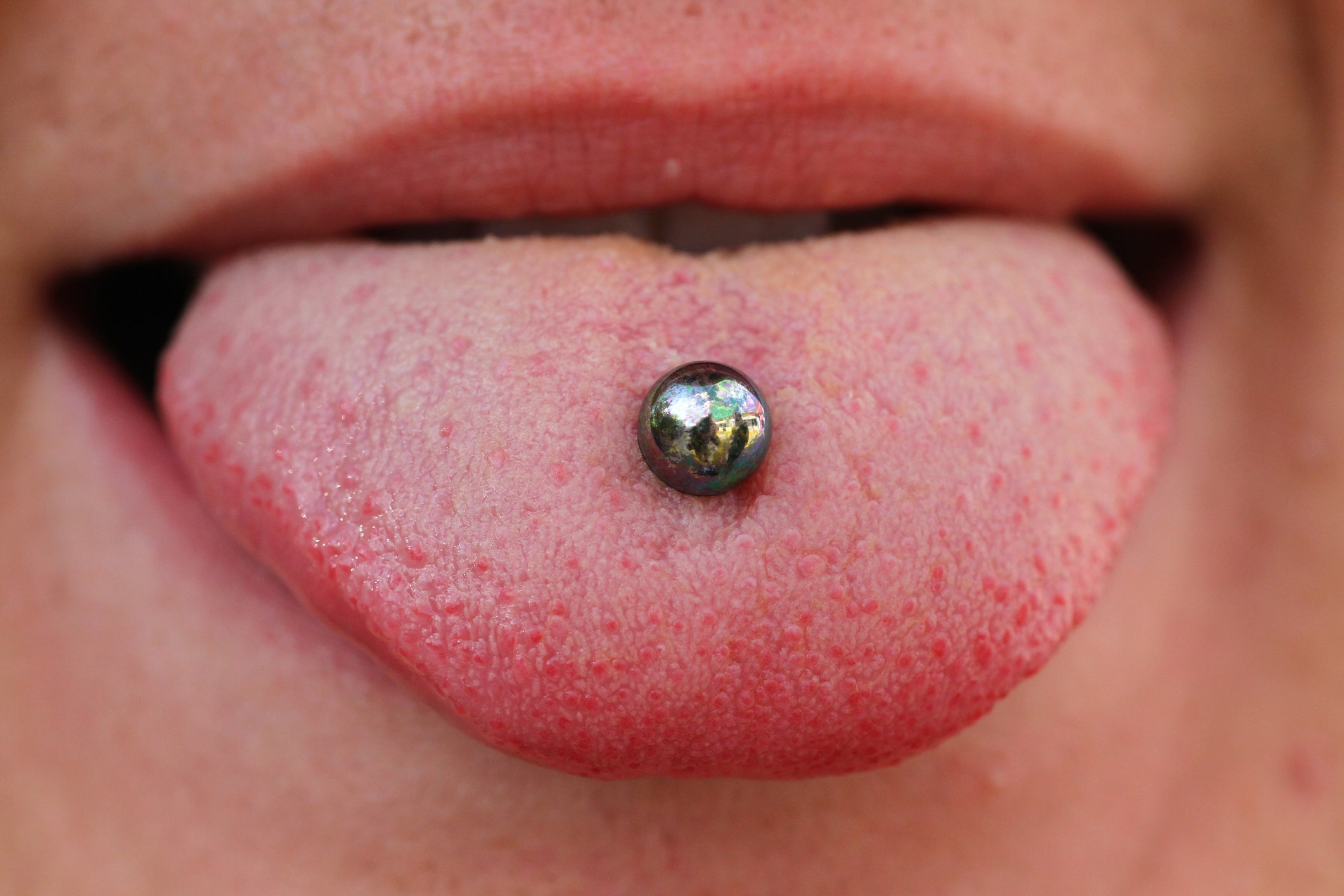
Piercings are growing ever more popular, and many people choose to express their individuality with an oral piercing. Unfortunately, cheek, tongue, and lip piercings often come with complications that can have an impact on your dental health. Before you get an oral piercing, make sure you know the risks.
Any piercing can cause an allergic reaction. You might experience pain and swelling after the procedure, or develop a skin infection that causes redness and pain or even scarring. When jewelry is accidentally ripped out, it can cause tearing and trauma, and piercings come with a risk of bloodborne diseases like Hepatitis B, Hepatitis C, and HIV. While those complications apply to all piercings, though, there are some problems that specifically occur with oral piercings. According to the American Dental Association, complications that can result from oral piercings include:
- Chipped or cracked teeth or a swollen tongue: The piercing can bump against your teeth while you talk or eat. You might even find that you sometimes bite it. When this happens, the piercing can injure your gums or crack or scratch your teeth. Your teeth may become sensitive, or you might damage your fillings. In addition, jewelry in your mouth can accumulate plaque, leading to tooth decay and cavities.
- Halitosis: It’s hard to properly clean your mouth when there’s jewelry covering part of your oral tissue. This leads to plaque bacteria and food debris building up in your mouth and causing bad breath.
- Bacterial infections: Your mouth is already a welcoming place for bacteria, because it’s so moist. Add in an incision and jewelry, and the bacteria trapped around your piercing can lead to infection, with symptoms of redness, swelling, pain, and a foul odor.
- Increased saliva: Usually, you want a good flow of saliva to wash out your mouth and prevent tooth decay. However, the excessive saliva flow that can be caused by an oral piercing can lead to the development of tartar, calcified plaque. Tartar hardens on teeth and under gums, and removing it requires a professional dental cleaning.
- Gum issues: Metal rubbing against the gums when you’re chewing, speaking, or just moving the piercing can cause gums to recede, which sometimes requires surgical correction. Piercings also raise the risk of gum disease, which can negatively impact your health and lead to tooth loss.
- Problems with dental care: Jewelry in your mouth makes it harder for your dental team to care for your oral health. It can even interfere with x rays and other diagnostic tools.
- Tissue trauma: Sometimes piercing jewelry becomes infected and must be surgically removed. You can also form scar tissue that may become large and require surgical removal.
- Changes in speech: Oral piercings can cause you to speak differently and impede your normal chewing.
- Obstructed airway: If the piercing becomes infected, you may experience breathing problems. Worse, if a piercing dislodges when you’re sleeping, speaking, or chewing, it can become lodged in the back of the throat, causing choking or airway obstruction.
- Nerve damage: After a piercing, your tongue may feel numb because of temporary nerve damage. Sometimes, though, this damage becomes permanent. This can affect your sense of taste and the movement of your mouth.
You might not realize it, but these complications are surprisingly common. While they don’t happen to everyone with oral piercings, they happen frequently enough and cause enough serious damage to be of concern. You can reduce your risk of complications, however, by being vigilant about caring for your mouth. Brush twice a day, floss, and use an alcohol-free mouthwash. Don’t play with your jewelry, stay vigilant for signs of infection, and periodically check to make sure it’s tightly secured.
If you’re looking for the perfect dentist, choose the practice that was voted best dentist in NYC! At Park 56 Dental Group, we offer pediatric, prosthodontics, endodontics, oral surgery, Invisalign®, emergency, and sedation dentistry, all at the highest level of treatment. We serve the Midtown, Central Park, Upper East Side, Park Avenue, and all surrounding Manhattan and New York areas, with a patient-centered practice that has hours to fit your schedule. Schedule your complimentary consultation today by contacting us online or calling us at (212) 826-2322.
-
How to Avoid Wearing Dentures in the Future

Growing older means facing a variety of challenges. Some of the difficulties that come along with aging are inevitable, but wearing dentures is not one of those things. There are steps you can take to be proactive with your dental care so that you won’t have to wear dentures in the future.
- First, brush your teeth. It may seem to simple and obvious to need to be stated, but many people to not properly clean their teeth. Did you know that over 20 million people in the United States are missing all of their natural teeth? That’s a lot of people who need dentures. Some of that tooth loss stems from poor brushing habits, because one in four adults in this country doesn’t brush twice daily. Lack of brushing leads to periodontal disease, which the National Institute of Dental and Craniofacial Research cites as the most common cause of tooth loss among adults. Brush your teeth twice a day, with a good toothbrush and fluoride toothpaste certified by the ADA.
- While you’re at it, floss! Flossing is important, because when tiny food particles are allowed to remain between your gums and teeth, they harden and turn into tartar. Tartar is often the cause of gingivitis which leads to periodontitis, which leads to lost teeth. Lost teeth, of course, lead to dentures. Floss at least once a day and consider augmenting your brushing and flossing routine by rinsing with a dentist-approved mouthwash.
- Schedule regular dental checkups. It is recommended that adults visit the dentist for a cleaning and exam every six months. Unfortunately, only about half of adults in the U.S. actually do that. These appointments are very important, though, for many reasons. When you have regular cleanings, the dentist and hygienist can help you keep tooth decay and gum disease at bay. Further, when your dentist examines your teeth every six months, there’s a better chance of catching any problems when they’re small, before they grow into major issues.
Of course, if you do end up needing dentures, it’s not the end of the world. Today’s dentures are much better than the dentures of generations past, and if you’re replacing missing teeth, you may even be able to get implants as well, provided you don’t have bone deterioration. If you have pain, bleeding gums, you’re losing your teeth, or you are having trouble eating, don’t suffer in silence. Instead, find a good dentist who can help you determine your best options.
If you’re looking for the perfect dentist, choose the practice that was voted best dentist in NYC! At Park 56 Dental Group, we offer pediatric, prosthodontics, endodontics, oral surgery, Invisalign®, emergency, and sedation dentistry, all at the highest level of treatment. We serve the Midtown, Central Park, Upper East Side, Park Avenue, and all surrounding Manhattan and New York areas, with a patient-centered practice that has hours to fit your schedule. Schedule your complimentary consultation today by contacting us online or calling us at (212) 826-2322.
-
How to Care for Sensitive Teeth
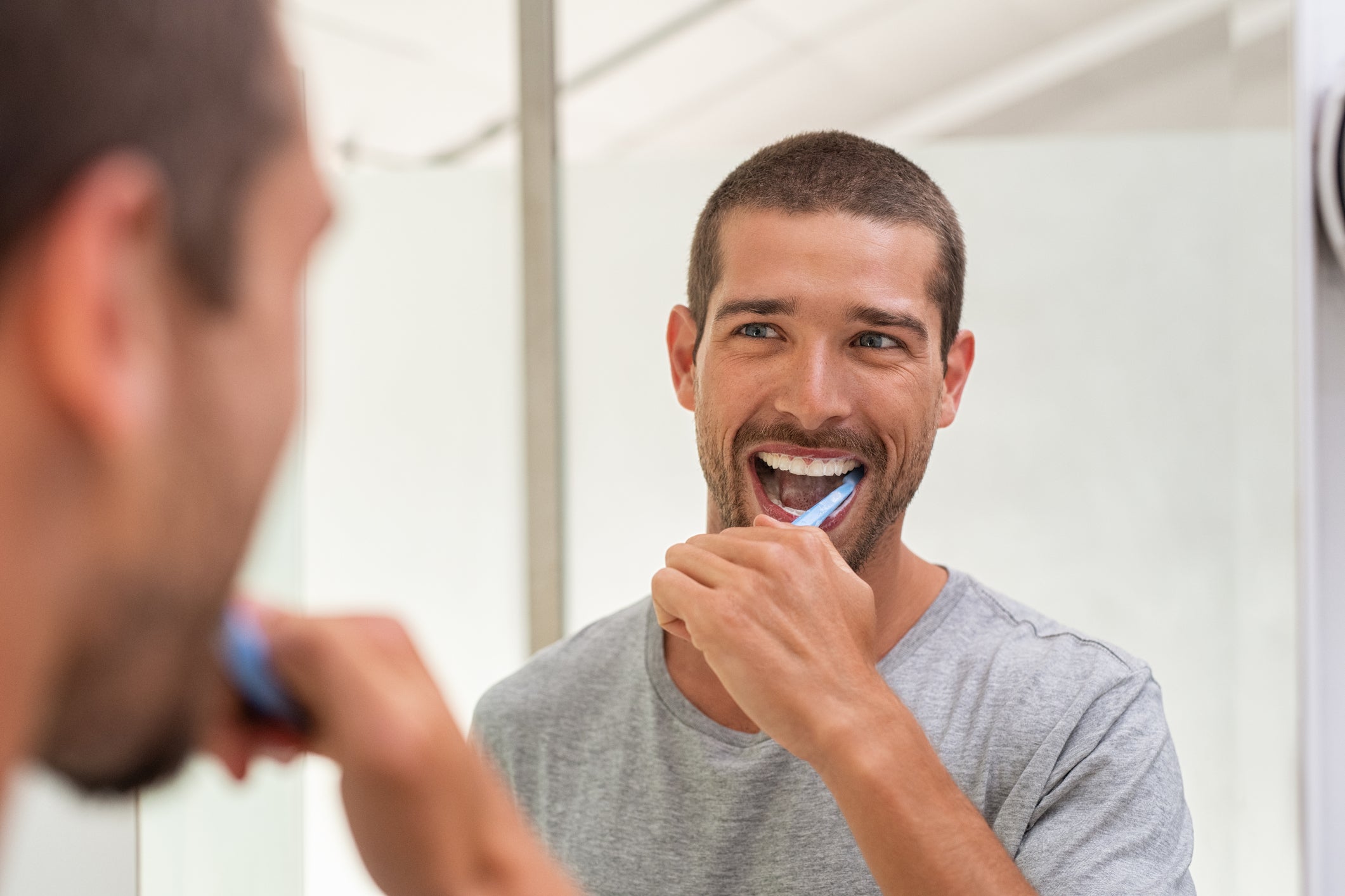
Do you experience pain after consuming hot or cold foods and beverages? The Academy of General Dentistry estimates that around 40 million people in the United States have some degree of tooth sensitivity. What causes sensitive teeth? And how can you manage it? Your dentist can offer some solutions, but there are also things you can do at home to help.
- Switch your toothpaste. Over-the-counter desensitizing toothpastes are made specifically to treat tooth sensitivity. These toothpastes have compounds that block the pain signals from your nerve endings to your brain and should decrease your sensitivity after a few uses.
- Brush more gently. Cleaning your teeth too vigorously can wear off your enamel, increasing sensitivity. Additionally, using a stiff-bristled brush can make tooth sensitivity worse by causing microscopic holes in your enamel and worsening gum recession. Use a soft bristled toothbrush and brush gently, holding the brush at a 45 degree angle to the tooth.
- Try some home remedies. A saltwater rinse can reduce inflammation, and hydrogen peroxide can act as an antiseptic and disinfectant to heal gums. Rinsing with honey and warm water can help your mouth heal, as honey is a natural antibacterial agent. Some people swear by oil pulling, swishing coconut oil around the mouth. Others use turmeric for pain and inflammation, massaging a paste made of turmeric into their gums. Cloves are a natural pain reliever with anti-inflammatory and germicidal properties. Using green tea as a mouthwash twice daily can strengthen teeth and reduce inflammation, and the capsaicin in hot peppers has analgesic properties when used as a topical gel or mouth rinse. Vanilla extract, applied to the gums with a cotton ball, can alleviate pain.
- Mind your diet. While certain foods can help sensitive teeth, others can make the problem worse. Acidic foods like soda and coffee, as well as high-sugar foods and processed carbs, can attack enamel. Even some healthy foods, like citrus fruits and flavored yogurt, can cause enamel erosion. Snack on tooth-strengthening foods like fiber-rich fruits and vegetables, cheese, milk, and plain yogurt. Drinking green or black tea is good for your teeth, and chewing sugarless gum can stimulate saliva production, helping to protect enamel. If you’re going to drink something acidic, use a straw so that less liquid makes contact with your teeth. Note: if you consume something bad for your enamel, don’t rush to brush. Swish with water and wait an hour before brushing, to avoid further damaging the enamel.
- Talk to your dentist. If sensitive teeth are troubling you, your dentist can find the cause. You may be grinding or clenching your teeth and need to wear a mouth guard or splint. Whitening treatments you’re receiving may be too harsh. A damaged tooth or gum disease can cause tooth sensitivity, so seeing your dentist can help address these issues. The dentist can also offer solutions like dental varnishes and sealants or even a root canal to fix the problem.
If you’re looking for the perfect dentist, choose the practice that was voted best dentist in NYC! At Park 56 Dental Group, we offer pediatric, prosthodontics, endodontics, oral surgery, Invisalign®, emergency, and sedation dentistry, all at the highest level of treatment. We serve the Midtown, Central Park, Upper East Side, Park Avenue, and all surrounding Manhattan and New York areas, with a patient-centered practice that has hours to fit your schedule. Schedule your complimentary consultation today by contacting us online or calling us at (212) 826-2322.
-
Why Your Teeth Chip Away
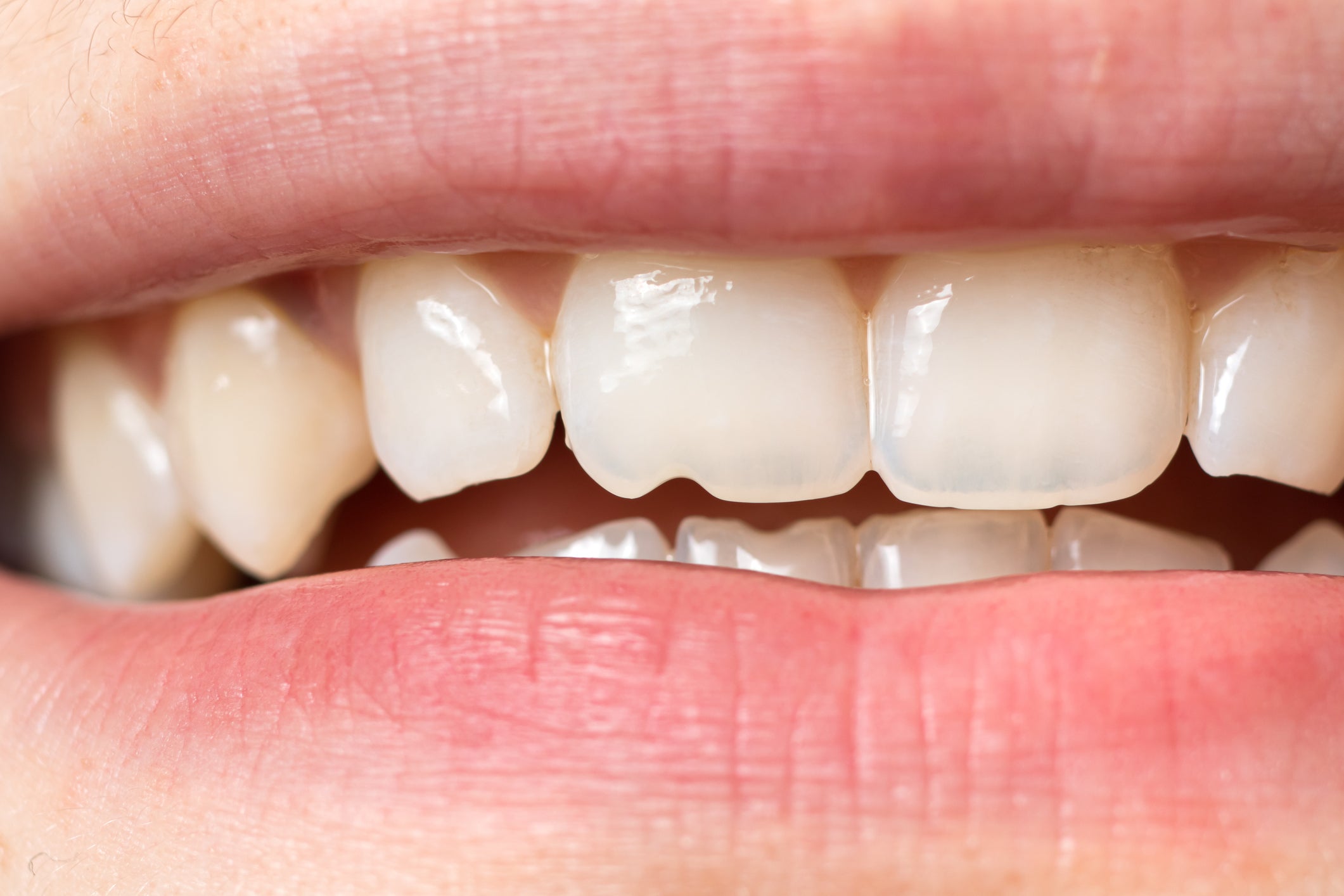
Enamel, the hard outer covering of your teeth, is the strongest material in the human body. So why is it that your teeth can chip away? Explore the causes of chipped teeth and what factors increase your risk.
Causes of Chipped Teeth
Enamel is tough, but it has limitations. Here are some common situations that may cause your teeth to chip:
- Biting down on hard candy, ice, or non-food substances
- Getting in a car accident
- Falling on your face or getting hit in the mouth
- Clenching your jaw during waking hours or grinding your teeth when you sleep
Risk Factors for Chipped Teeth
Strong, healthy teeth shouldn’t chip and crack. If your teeth are prone to this problem, learn the possible reasons why so you can take steps to prevent chipped teeth:
- Genetics: Some people have genetic traits that undermine the strength of their tooth enamel. Unfortunately, you have no control over this risk factor.
- Poor diet: If you don’t supply your teeth with the minerals they need, they won’t be as strong. The best foods for a healthy smile contain calcium, protein, folic acid, fiber, and vitamins A and D. Include more fruits, vegetables, nuts, and low-fat dairy in your diet to increase your intake of these nutrients.
- Tooth decay and enamel erosion: Too much sugar and acid in your diet can decay and erode your teeth. Large fillings also tend to weaken the natural tooth material around them. To lower your risk, eat less candy, soda, juice, citrus fruits, and starches.
- Misaligned bite: Crooked teeth aren’t just a cosmetic concern. If your teeth don’t align properly, something as simple as chewing could chip or crack a tooth. Fortunately, braces can help fix this problem.
- Acid reflux: Stomach acid is potent enough to damage tooth enamel. If you have acid reflux, heartburn, or an eating disorder that causes frequent vomiting, your teeth could weaken significantly and be more vulnerable to chipping.
- Contact sports: Do you play football, hockey, rugby, or other contact sports? If so, you’re more likely to suffer mouth injuries. Protect your teeth, lips, and gums by wearing a mouthguard.
- Bruxism: Teeth grinding, also known as bruxism, can wear down enamel. This makes you more prone to chipping a tooth during your day-to-day activities. Protect your teeth by wearing a custom-made mouthguard while you sleep.
- Age: Tooth enamel naturally wears down over the years, increasing your risk of chipping a tooth as you age. If you’re over age 50, talk to your dentist about any additional precautions you should take.
If you need help repairing a chipped tooth, turn to Park 56 Dental. We offer veneers and composite fillings to fix chipped teeth pain-free. We also fit patients with custom Under Armour® mouthguards to help prevent chipped teeth. You’ll love receiving treatment in our spa-like New York dentist office, so don’t hesitate to schedule an appointment today! Contact us at (212) 826-2322 to get started.
RECENT POSTS
categories
- Uncategorized
- Cosmetic Dentistry
- Veneers
- Healthier Teeth
- Teeth Whitening
- Dental Health
- Video
- Dental Emergencies
- Invisalign
- Dental Implants
- Root Canal
- Sedation Dentistry
- Infographic
- Dental Crowns and Bridges
- Dental Anxiety
- Gum Disease
- COVID-19
- Bad Breath
- New York Dentist
- Cut out sugar
- General Dentistry
- Oral Health
- Oral Cancer
- Dry Mouth
- Gum Health
- Toothache
- Dental Sealants
- Cavities



